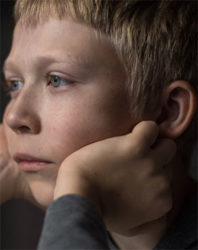
If the Oscars handed out an award for “Most Spot-on Name,” then Loveless would be the odds-on favourite. Director Andrey Zvyagintsev’s follow-up to his soul-crushing 2014 film, Leviathan, is just as bleak. Zvyagintsev has plenty to say about his Russian homeland and he uses films as outlets to call out church and state. In Loveless, Zvyagintsev once again scrutinizes life in his motherland, this time casting an unflattering eye on a married couple’s toxic relationship and the toll it takes on their young son. With its heartbreaking performances and stoic cinematography, Loveless is crafted to wash over audiences like an icy blast of Siberian air.
Zhenya (Maryana Spivak) and Boris’ (Aleksey Rozin) marriage is in shambles. They can’t stay in a room together for more than a few minutes without breaking into a screaming match. When Loveless begins, they’ve already decided to call it quits and they’re sorting out the final details, chiefly, who gets custody of their son Alyosha (Matvey Novikov). If this movie was called Loving they would battle for custody. But it’s not. Instead, each parent wants to rid themselves of Alyosha and custody becomes a game of hot potato. Alyosha, already exhausted from living in an emotional war zone, overhears his parents fighting over who gets stuck with him. The next day, Alyosha leaves for school and then vanishes off the face of the earth, and at first, his parents don’t even notice. Once they realize their son is gone, Zhenya and Boris must put aside their differences long enough to find him — but doing so is easier said than done.
Anyone who has watched more than a handful of movies is well versed in love – mostly the pursuit of it. We see underdogs pursue the boy/girl of their dreams, heroes rescue captured lovers, and even strangers with nothing in common fall head over heels for each other. Fewer films are interested in examining love in practice, its successes and failures. Loveless leads us to the wreckage of a love gone awry and revels in the aftermath.
Loveless tells us that unconditional love is not guaranteed, not even in the sacred bond between parent and child. Instead, love is a skill we must nurture and develop lest it should atrophy. And as we all flock to our iPhones seeking connections with each other, we do so at the expense of actual intimacy.
Alyosha’s self-absorbed parents wouldn’t know that their child has run away unless he announced it as a Facebook status update. And yet, that doesn’t make them monsters. Zvyagintsev makes it clear that we’ve all let smartphones bend us to their will. He depicts people ignoring each other in public spaces like restaurants and offices and even in the intimacy of their bedrooms, all zombified by the glowing screen in their hands. One shot on a train is almost cartoonish in execution, with a row of commuters lined up shoulder to shoulder, oblivious to the world around them. Zvyagintsev isn’t telling us anything we don’t already know but seeing this fact-of-life recreated on the screen through the lens of his placid camera makes his statement feel sobering.
I’m a big fan of cinematographer Mikhail Krichman’s work on this picture. His cinematic eye is impeccable; he has a skill for transforming mundane shots – bus stops, schoolyards, condemned buildings – into stunning compositions. I fell under his spell during long silent sequences when the camera drifted through the world; gliding and probing as though it were a phantom haunting each scene. There’s also an invasiveness to the camerawork that had me feeling uneasy even during the film’s most innocuous moments. I would love to see Krichman and Zvyagintsev collaborate on a horror picture.
Loveless is a fascinating movie but also a tough one to recommend. Its languid pacing and nuanced storytelling make it hard to suggest to anyone who doesn’t hoard Criterion Collection titles. However, the excellent performances, brilliant cinematography, and provocative themes make Loveless a film I’ll go out of my way to recommend to the cinephiles in my life.
Loveless isn’t the sort of movie that you watch to unwind after a tough day. It doesn’t have a high opinion of humanity and gives no f#@ks whether you walk away in a good mood. It takes a high degree of technical artistry to toy with the audience’s emotions as effectively as Zvyagintsev does here. Call me a glutton for punishment, but for 2-hours, Loveless pummeled me like a vengeful wrecking ball, and I loved every minute.
- Release Date: 2/23/2018


